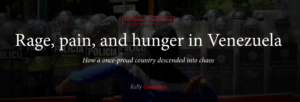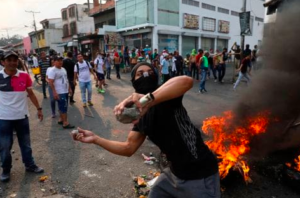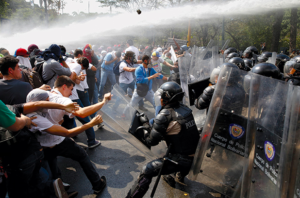From Dawes we learn that words matter, language matters. On page 223 he quotes Hong Ying,
“Everything I narrate / seems to have lost its meaning.”
And then on the next page this from Gilbert Holleufer,
“The language disincarnated, it disembodied reality, and they [the affected community] know it. They know we are disembodying their reality, we are dissolving it into words. ….Humanitarian language is part of the threat they have.”
Reflect on how the media depicted the humanitarian crisis that you researched for class (or any of the others presented by your classmates). What language was used to describe the situation and the lives of those in the affected community? How does this language affirm -or not- the points Dawes is trying to make?
_______________________________________________________________________________
What may not come as a surprise is the heavy use of the word crisis when describing the conflict in Venezuela. When researching what exactly has left the Latino country in such unrest, I was led from a leadership dispute, to a myriad of issues. The headlines don’t detail just one, but multiple crisis including: economic, political, migrant, and GBV. The accompanying articles often also provide graphic imagery of starving children and violent protests. What is interesting though, is that this dedication to highlighting what’s wrong in Venezuela has only recently begun. I first thought that because many of the articles I had found were recent publications- that these issues were recent as well. But when looking at a timeline of Venezuelan history, I realized that wasn’t the case at all. There are blatantly significant stages of worsening recorded by respectable sources for the past ten years. Venezuela had not only been collapsing for some time, but by 2014 was in a fully-fledged economic and political “crisis”. So why then are the problems of Venezuela being so forcefully propagated now? I won’t pretend that I truly know enough about the situation or about humanitarian aid work to answer this as fact- but from both the research I have done, and Dawe’s explanation of the use of language, I have two theories. They go hand-in-hand, the first being that the many crisis in Venezuela progressed to the point at which they’re at now because the world choose to ignore them. The second being that because the country is now in such complete turmoil, the language and propaganda has to be especially aggressive. Had we have sent help when the problems were first rooting, we may have had different narrative, and a different outcome.
So, what was the media saying in the earlier stages of Venezuela’s collapse? In almost every case, news coverage formally recognized Venezuela’s declaration of recession but dismissed the idea that it would get significantly worse. The United States media blamed the downturn as a consequence of socialist policies and over-spending. Diego Moya-Ocampos, senior political risk analyst for the Americas at HIS stated: “We have no concerns over Venezuela’s capacity to pay in the one-year outlook”. It was also a widely accepted expectation for the country to use the remains of the government savings to bring the country back to break-even. But if you look at the data being released at the same time as these dismissive news-breaks, to expect anything of the sort was completely unrealistic. It is popular information that Venezuela is home to the world’s largest oil reserves, and so if they were capable of operating the market efficiently, they have the potential to become incredibly powerful. This assumption unfortunately masked the reality of Venezuela’s vulnerability. In this case it is difficult to apply Dawes argument against humanitarian language, because little is said. The first quote,
“Everything I narrate / seems to have lost its meaning.”
… is interesting to consider in the context of 2014 Venezuela. What was being said had not “lost meaning” but rather re-assigned it. What was publicized wasn’t necessarily the whole truth and so there wasn’t much to consider. However, the second quote…
“The language disincarnated, its disembodied reality, and they [the affected community] know it. They know we are disembodying their reality, we are dissolving it into words. …. Humanitarian language is part of the threat they have.”
…is very much true, in a different context than Dawes intended I think, but true nonetheless. The reality of Venezuelan citizens was very much disembodied, disconnected, and honestly destroyed. What was happening was being ignored, and the humanitarian language that should have been assigned to the situation was lacking.
(This is an example of the news response during early stages of the crisis)
(These are the more recent headlines)
On the other hand, media releases coming from Venezuela were even more misleading. While the citizens, businesses, and associates of the country recognized and vocalized the problems occurring- the government worked alongside the media to control what was published about both their economic and political faults. Though the world was never “Blacked-out” from the country’s issues, most TV and radio channels are either owned by the government or subject to self-censorship. Jon Allsop, from Columbia Journal stated, “The government frequently discredits negative reporting as propaganda invented by a hostile world media, pushing counter-narratives that flat-out deny the existence of many of the country’s problems.” I wouldn’t consider this as an excuse for the dismissive nature of the United States and other world leaders, but it certainly didn’t support any sort of call to action.
Looking to the present publications concerning Venezuela- the first and most important change, is the tone taken to describe the situation. Whereas before it felt as though I was reading about simply foreign news, not a real crisis, and no call for concern- the more recent writing is graphic, and argues for immediate aid. (I’ve attached a particularly graphic NY Times post at the bottom) One thing that the media is getting absolutely right is the tense with which they speak about the state of Venezuela. While they may not have well-enough publicized the problem as it developed, new writing does recognize that the country’s political and economic system isn’t collapsing but has rather collapsed. Unfortunately, though saying this is accurate, the depth to which they push the idea is rather sensitive. The articles have begun to predict the problems in Venezuela so horrifically, it may seem to some that they are beyond repair. Writers should caution themselves against painting a picture so fervent, that the cry for help is lost. Much like Dawe’s argues when quoting Hong Ying, neither an emotional evocation or analytical presentation will move people to help. Your words must connect on a human level to inspire humanitarian action. I think that the best way to do this is to use as much conversation as possible from the Venezuelan citizens themselves. There cannot be a more accurate way to tell someone’s story than simply have them tell it themselves. When considering who has the right to speak on a situation, or represent the victims of a crisis it largely depends on the state of that crisis and position of those victims. We ignored the beginnings of Venezuela’s disintegration, and their government continues to muffle their voices. I think we owe it to them, to speak on their own behalf for if it was not their right to do so before, it most certainly is now.
https://www.nytimes.com/interactive/2017/12/17/world/americas/venezuela-children-starving.html
Below are some of the most recent pictures of the Venezuelan crisis, such images as these are what is being so included in nearly all recent articles (even if the articles aren’t about rioting/protest)
Allsop, Jon. “Venezuela’s War on the Press.” Columbia Journalism Review, CJR, 25 Jan. 2015, www.cjr.org/the_media_today/venezuela_crisis_maduro_trump.php.
Constable, Simon. “Doomed Venezuela: This One Number Shows Just How Bad It Is.” Forbes, Forbes Magazine, 8 Mar. 2019, www.forbes.com/sites/simonconstable/2019/03/08/doomed-venezuela-this-one-number-shows-just-how-bad-it-is/#2470fcac48a8.
Nagel, Juan Cristóbal. “Venezuela’s Political Crisis Hits the Streets.” Foreign Policy, Foreign Policy, 13 Feb. 2014, foreignpolicy.com/2014/02/13/venezuelas-political-crisis-hits-the-streets/.
Shaffer, Leslie. “Is Venezuela Headed for a Default?” CNBC, CNBC, 8 Dec. 2014, www.cnbc.com/2014/12/07/is-venezuela-headed-for-a-default.html.
Specia, Megan. “What Is Happening in Venezuela and Why It Matters.” The New York Times, The New York Times, 30 Apr. 2019, www.nytimes.com/2019/04/30/world/americas/venezuela-crisis.html.
staff. “Venezuela Profile – Timeline.” BBC News, BBC, 25 Feb. 2019, www.bbc.com/news/world-latin-america-19652436.





